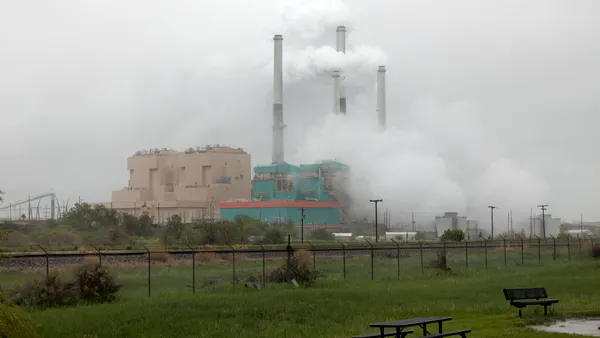Dive Brief:
- President Trump's nominee for the No. 2 slot at the Environmental Protection Agency told senators on Wednesday that he was present for preliminary discussions that led to the crafting the Department of Energy's cost recovery proposal for coal and nuclear plants as a lobbyist for Murray Energy.
- Andrew Wheeler, nominated to be deputy administrator at EPA, said he viewed a confidential plan designed by Murray and submitted to the White House to revive the domestic coal sector. Wheeler also said he attended two meetings — one at the Department of Energy and one on Capitol Hill — that focused on shaping the contents of that plan into what would eventually become the DOE's cost recovery proposal.
- Democrats on the Senate Environment and Public Works Committee said they would press Wheeler for more details on his involvement in crafting the DOE proposal, but Committee Chairman Sen. John Barrasso indicated he is not concerned about Wheeler's involvement and said he expects the nominee to clear his committee.
Dive Insight:
Ever since the Department of Energy issued its Notice of Proposed Rulemaking (NOPR) to provide cost recovery for merchant coal and nuclear plants, power sector insiders have speculated Murray Energy was intimately involved.
Bob Murray, the company CEO, has repeatedly bragged about submitting a confidential, three-page plan to the Trump administration to save the coal industry, telling Bloomberg this month the agency is already through much of the first page and a half.
During his nomination hearing, Wheeler said he had seen the plan nearly a year ago in his role as a lobbyist for the coal giant.
"I saw it briefly at the beginning of the year," Wheeler said in response to a question from Sen. Sheldon Whitehouse (D-RI), "but I don’t have a copy of it."
Wheeler, a former staffer for Sen. James Inhofe (R-OK), was a registered lobbyist until August, listing Murray Energy as a client. Pressed by Whitehouse, Wheeler stressed that he "did not work on" the memo and said he could not remember even basic details about it.
"I don’t even know how many pages it was," he said. "I did not have it my possession. I looked at it, handed it back to [CEO Murray]."
Later in the hearing, however, Wheeler revealed that he was also present for meetings that aimed to drum up support for baseload generation in the months before the NOPR's release. It was Whitehouse who pushed the issue again, asking if Murray or its CEO were involved in making recommendations to DOE.
"Certainly Murray Energy has been supportive of that effort and I did attend a meeting with Murray Energy at the Department of Energy where this was discussed months ago," Wheeler said, "but I de-registered [as a lobbyist] in August and have not been involved over the last few months on this issue."
Pressed further by Whitehouse, Wheeler recalled that he "attended one Hill meeting on that as well." But he distanced himself from the contents of the NOPR, saying he "did not work on putting that together."
EPA spokesperson Liz Bowman later confirmed that Wheeler attended two meetings, and that the Hill meeting was with staffers from the House Energy and Commerce Committee.
"Mr. Wheeler participated in two preliminary discussions about the need for baseload energy well before this was a key issue," Bowman said. "He has not participated in any further discussion since August."
DOE did not respond to a request for comment and Murray Energy declined to comment.
Whitehouse was clearly unsatisfied with Wheeler's answers, particularly comments from the nominee early in the hearing implying attorney-client privilege may apply to his communications with Murray. The senator said he would press for more detail on the coal memo and NOPR in written questions, but indicated it could come down to Chairman Barrasso to compel Wheeler to divulge more details.
"It's important to try to drill down on this but very often it takes the support of a chairman of a committee to actually force an answer," he told reporters after the hearing. "To the extent that our Republican chairmen are unwilling to pursue these questions and are providing cover for these bogus [client privilege] assertions, it's difficult for us."
Barrasso, for his part, seemed untroubled by the revelations. Asked if Wheeler's role in crafting the NOPR concerned him, Barrasso said the nominee "the right person for the job," and that the expects him to clear the committee.
If confirmed, Wheeler would take the the EPA's powerful number two slot, filling the role previously held by Janet McCabe, who led the agency's efforts on the Clean Power Plan. His nomination was supported by fossil fuel interests, who expect him to help Administrator Scott Pruitt reduce regulations on the energy sector.
In addition to Wheeler, the Senate committee also questioned Kathleen Hartnett White, a former Texas air regulator tapped for the White House Council on Environmental Quality. Lawmakers focused on a series of inflammatory statements from the nominee in the past, including comments comparing belief in climate change to paganism.
Hartnett White largely walked back those earlier statements, but repeated her skepticism for many facets of mainstream environmental science, including climate change and the impacts of ground-level ozone.
"As an atmospheric gas, [CO2] is a plant nutrient," Hartnett White said. "It’s likely CO2 emissions from human activity have some influence on the climate, but CO2 in the atmosphere has none of the characteristics of a pollutant the contaminates and fouls and has a direct impact on human life."
Barrasso said he expects her to clear the committee as well.
This post has been updated to include comment from EPA.











